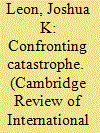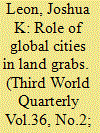| Srl | Item |
| 1 |
ID:
108253


|
|
|
|
|
| Publication |
2011.
|
| Summary/Abstract |
Social environments played a powerful role in the institutional adaptations of the AIDS fighting agencies within the United Nations system. Since its AIDS apparatus has become operational, the UN has undertaken two major strategic shifts. The first shift saw the dissolution of the GPA, a small subunit of the WHO in favour of UNAIDS, a dedicated agency engaged in global advocacy. This shift involved a controversial bureaucratic process that led, finally, to a more human rights-based approach to the disease. The second shift saw an increased emphasis on ground-level efficiency. What caused these changes? Contributions in the rationalist tradition expect the UN to act as a multilateral goal-seeker looking to optimally address a major gap in global governance. A sociological framework sees normative changes within the UN as catalysts for change in its goals and structure. A synthesis of these traditions conceptualizes the UN's strategic shifts more clearly, capturing the interactive process between the organization and its strategic environment. UN agencies were forced to rationally adapt to changing conditions in prevailing AIDS norms.
|
|
|
|
|
|
|
|
|
|
|
|
|
|
|
|
| 2 |
ID:
137729


|
|
|
|
|
| Summary/Abstract |
Key trends link a globally connected urban archipelago and its hinterlands, warranting new studies of power in its most contemporary forms. This article locates land power and where that power is exercised – looking at the burgeoning global land rush from the perspective of cities. Urbanisation continues to drive vast political transitions, uprooting longstanding agrarian modes of living while creating myriad inequalities within cities. Are the world’s most powerful agglomerations active agents in this transformation? Answering affirmatively, the article reframes urbanisation as a vast, global geopolitical transfer of power from rural to urban. Leading global cities like New York, London, Hong Kong, Chicago and Singapore are not merely impressive collections of factor endowments. They are also sites of concentrated power with coercive influences beyond municipal boundaries. The article asks how cities project power in the contemporary global system. Juxtaposing data on global connectivity with the location strategies of private firms, we learn that the world’s most successful global cities are also sources of exploitative accumulations of land.
|
|
|
|
|
|
|
|
|
|
|
|
|
|
|
|